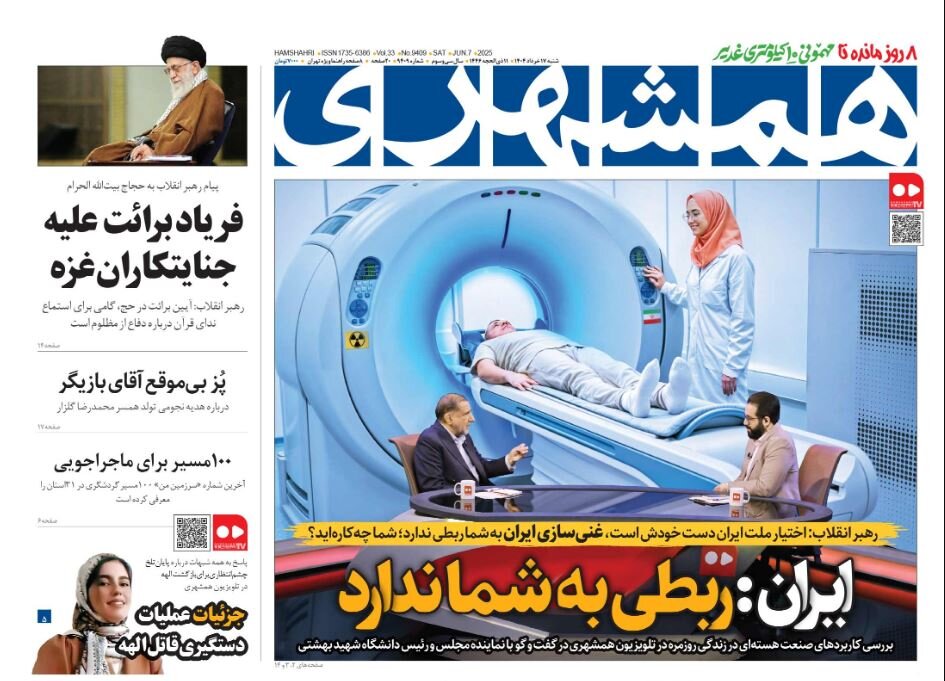The wrong address that Westerners give about Iran

TEHRAN - In a note, Hamshahri discussed why Iran is defending its right to enrichment and said: Uranium enrichment in Iran has become the focal point of indirect negotiations between Iran and the United States in a situation where, given the central importance of the "complete nuclear fuel cycle" in the nuclear industry, the opposing parties are trying to cut off the chain of this strategic industry in Iran.
The Western parties are trying to deprive Iran of uranium enrichment, with false excuses and arguments such as Iran's access to oil and fossil fuels, while the heart of the nuclear industry, as a "mother industry", beats with enrichment. In recent years, with the efforts of domestic experts, Iran has been able to master the complete nuclear fuel cycle and be among the few countries in the world that benefit from this capability. In such circumstances, showing Iran’s nuclear program as a political-security issue is considered a “misguided” move, because today the nuclear industry has important and multifaceted impacts on people’s lives in various fields, from energy and medicine to food security and industry.
Jam-e-Jam: Iran is not Ukraine
Jam-e-Jam discussed the new round of indirect nuclear negotiations in an interview with Abolfazl Zohrevand, a member of parliament. He said: The negotiations are scheduled to begin on Saturday. Trump was brazenly suggesting that Iran should come to talks and agree to the terms of the negotiations, otherwise, there will be war. He wants to create a process similar to the negotiations with Zelensky and see the agreement signed right now. He wants a letter of surrender in the negotiations, otherwise there will be war. However, Iran demonstrated that it is not Ukraine and proved that it has not been weakened, despite the developments in the region. Now, we need to assess how serious the U.S. is about resolving conflicts in the talks. They are not going to conclude these talks, and our goal is only to know their positions. This negotiation is like the JCPOA. Its achievement and outcome will be important for America.
Ham Mihan: Putin's upcoming trip to Tehran
In an analysis, Ham Mihan discussed Putin's upcoming trip to Tehran. It stated: Putin will hold high-level meetings in Tehran that could be utilized for consultations on nuclear negotiations, initiatives, solutions to the current dilemmas, the nuclear consortium proposal, the right to uranium enrichment, or nuclear cooperation. It is important to note that public opinion and state media have a clear stance toward the United States; however, there is a significant effort to whitewash Russia in Iran, which contradicts historical realities. From another perspective, it is necessary to examine Russia's broken promises and violations of agreements in their historical context. Currently, there is a strategic cooperation agreement between the two countries, and it remains to be seen how the Russians will play their role. It is also important to note that the Russians currently have more significant conflicts with the U.S., and their bilateral relations are not in a positive state that would allow them to be effective on that front. Rather, their influence will likely be more pronounced in Tehran, and the American side likely expects this as well.
Siasat-e-Rooz: It's time to deal seriously with the West
Siasat-e-Rooz focused its headline on the hostile behavior of the West and the European troika in the Board of Governors. The paper stated: Experience has shown that any retreat in the face of Western exaggeration and pressure only leads to an increase in their actions. Today, the Americans are openly demanding the destruction of Iran’s nuclear facilities, including its enrichment program. Although the Europeans are not directly involved in the negotiations, they are effectively acting as a lever for American sanctions pressure, bullying within the Agency, and making claims to trigger the snapback mechanism. As the Board of Governors meeting approaches, this role seems to be becoming more prominent. To confront future threats, it is necessary to adopt decisive measures such as installing new centrifuge machines, reducing cooperation with the IAEA, and suspending nuclear negotiations. The concurrent claims and pressures alongside American proposals to Iran indicate that the U.S. is seeking excessive demands from Iran, which include eliminating all of Iran's nuclear industry, including enrichment. However, many industries and medical activities depend on nuclear technology.
Leave a Comment